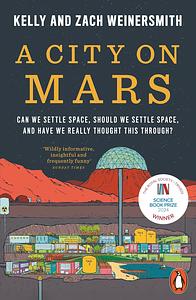Take a photo of a barcode or cover
funny
informative
slow-paced
adventurous
funny
hopeful
informative
lighthearted
reflective
fast-paced
Growing up on a diet of Kim Stanley Robinson, I was all set for scepticism on encountering this book. Who are these guys to come and poop the party, and ruin our dreams of a Martian Utopia? Very quickly though, in their humorous tone and measured, informed and elegant way, they explain all the many reasons for not rushing into settling space. How the arguments often given for settling space as a matter of urgency are misguided at best, and downright dangerous at worst.
There is, the authors explain, a lot more research needed in key areas such as biology, reproduction, ecology, international law, geopolitics, sociology and economics to ensure that humankind's transition from being a single-planet species to a multi-planet species is safe, peaceful and productive. Not to mention that much of this key research will inevitably also have far-reaching benefits on Earth.
In the attempt to build new, self contained ecosystems, imagine how much we could learn about fixing and conserving those on Earth. While figuring out how to improve the chance of cooperation among small, isolated groups of people, what can we learn about our own psychology and our capacity both for competition and collaboration? How can we use existing legal frameworks to humanity's advantage when setting up a new society in a new land, when the vested interests are likely profit-driven and armed with nuclear weapons? And who knows what medical benefits might be discovered in learning about how to protect developing embryos from radiation and low gravity? The challenge is far from just building a big enough rocket and having big enough dreams...
What is most admirable is that they lay out all conceivable counterarguments to their thesis, leaving these topics open for some much-needed further debate.
"In healthy communities of thought, the people in the corner shaking their heads and wagging their fingers aren't barriers on the road to progress, but guardrails."
There is, the authors explain, a lot more research needed in key areas such as biology, reproduction, ecology, international law, geopolitics, sociology and economics to ensure that humankind's transition from being a single-planet species to a multi-planet species is safe, peaceful and productive. Not to mention that much of this key research will inevitably also have far-reaching benefits on Earth.
In the attempt to build new, self contained ecosystems, imagine how much we could learn about fixing and conserving those on Earth. While figuring out how to improve the chance of cooperation among small, isolated groups of people, what can we learn about our own psychology and our capacity both for competition and collaboration? How can we use existing legal frameworks to humanity's advantage when setting up a new society in a new land, when the vested interests are likely profit-driven and armed with nuclear weapons? And who knows what medical benefits might be discovered in learning about how to protect developing embryos from radiation and low gravity? The challenge is far from just building a big enough rocket and having big enough dreams...
What is most admirable is that they lay out all conceivable counterarguments to their thesis, leaving these topics open for some much-needed further debate.
"In healthy communities of thought, the people in the corner shaking their heads and wagging their fingers aren't barriers on the road to progress, but guardrails."
medium-paced
informative
medium-paced
funny
informative
medium-paced
funny
informative
medium-paced
informative
reflective
slow-paced
funny
informative
medium-paced
lighthearted
reflective
slow-paced

